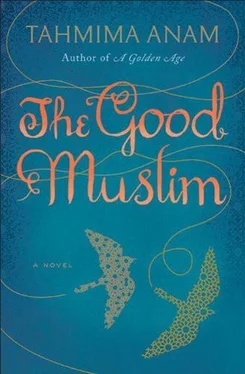She heard the pointed tone of his voice. He was telling her something. He was telling her that she had not learned to be humble; that she had put her will before that of God’s. And was she being punished, was that it?
Maya was reminded of a story she had heard during the war. A man had been shot with a machine gun, three bullets entering his back. The field doctors had operated (no anaesthetic, only a rag between his teeth) and removed two bullets, missing the third entry wound. A fragment of the bullet had entered his bloodstream and circulated within him, travelling through arteries like a tourist, until it had finally lodged in his heart, killing him instantly.
Medically, she knew the story could not be true. But she allowed herself to imagine it was this way with her and Sohail. They had been injured, perhaps by the death of their father, or by the thin whisper of poverty that hung on their backs throughout their childhood. In Maya, the pointed black thing travelled freely, now touching her liver, now her limbs, now her stomach. She would awake to it, and unleash some of its poison on whoever happened to be nearest. Ammoo had received the worst of it; Sohail too.
But Sohail’s shrapnel had lodged in his flesh, percolating through him ever so slowly, until, like the rest of them, he was dying on his feet, only faster, and the knowledge of this speed, that earthy scent of the grave, was what had made him, from that early age, a creature half-spirit, half-man. It was why he commanded an audience whenever he spoke, on the march or in the pulpit, why those in his orbit scrambled for a closer look, a touch. He had been born for prophesy, already, from those early moments, the master of himself. But what he was saying to her now was that the source of his power was not in command but in surrender. She too should now accept her smallness, her human limitations. And if she did not, the consequences would be unhappy.
Afterwards, the men cleared out, the curtain was drawn open, and the women began to make their preparations for the evening meal. Sohail’s sermon nagged at Maya. She left the meeting room and found Khadija squatting over a small gas burner in the kitchen.
‘Were you pleased by the bayaan?’ she asked. Even without the cadence of recitation, Khadija’s speech was formal.
Maya didn’t know how to reply. Pleased was not how she would have put it.
‘The boy,’ she began, ‘my nephew.’
‘You are referring to Huzoor’s son?’
‘Yes, Zaid. I’ve been teaching him a few things, lessons, but with Ammoo’s illness, I don’t have as much time. I would like to enrol him in school.’
Khadija appeared to consider this for a moment. She stirred a handful of chillies into the pot of dal.
‘He’s troubled,’ Maya continued.
‘You are right,’ she said, taking her by surprise. ‘I will not deny it. Your brother agrees.’
‘So you know.’
‘We were discussing it yesterday, with Haji Mudasser.’
Maya knew who Haji Mudasser was. The people upstairs consulted him on every matter, no matter how small. They lowered their heads in front of him and took his blessing on their heads. They did everything he said.
‘Haji Mudasser has told us that it is our duty to ensure the boy’s proper upbringing. We understand that we have failed at this.’
Khadija stretched out her hand, thick and solid, and wrapped her fingers around Maya’s wrist. ‘We have resolved to do better. Amra neyot korechi.’ They had made a promise, under the watchful eyes of the Almighty.
Khadija appeared unwilling to say more. Maya allowed herself a thin thread of hope.
‘Will you join us? The Maghreb Azaan will begin in a few minutes.’
‘I have to get back. Ammoo needs me.’
‘We pray for her every day. The Huzoor is a devoted son.’
‘Thank you,’ Maya said, suddenly moved by this statement.
‘Have faith, Sister Maya,’ Khadija said. ‘The boy will be looked after, and your mother will soon recover.’ Khadija continued to grasp her hand. Maya had a flash, a presentiment, that Khadija would be her sister, the fellow spirit she had always searched for. Khadija put her hand on Maya’s forehead, which she took as a sign that it was time for her to leave.
Maya walked back downstairs, her forehead hot from the imprint of Khadija’s hand. Surprised at how reluctant she had been to leave her.
On the third day, Maya went upstairs without an invitation. She had just spooned a bit of broth into her mother, checked her stitches and watched as she fell asleep. The women were sitting in long rows along the wall, heads bent over plates. Rokeya passed along the rows, ladling rice. ‘Maya Apa,’ she said, ‘please, eat with us.’ Khadija nodded to her, smiling. Maya liked their lack of surprise at seeing her. A new jamaat had arrived from South Africa. Black and white women fingered tasbis and joined in the prayers. When the recitation began, her eyes filled with tears.
She found herself leaning into Khadija’s arms. ‘Ammoo, will she be all right?’
Khadija caressed the top of her head with a light, tender touch. ‘Of course, God willing, she will remain with us.’ She braced herself, worried Khadija was about to feed her some story about the importance of accepting death as God’s will. But Khadija remained silent, moving her hand now to Maya’s forehead, where she kept it like a poultice, until Maya closed her eyes and began to believe her.
After Piya disappeared and Sohail was spending more and more time on the roof with his book, he was invited to meet Sheikh Mujib. The Father of the Nation was now the prime minister, and he wanted to see the faces of the boys who had delivered the country. Maya was thrilled. She had an idea that the sight of the great man, fatherly and expectant, would give Sohail a reason to snap back into his old life. When the invitation arrived, it included all of them — Sohail, Rehana and Maya.
On the morning of their appointment Sohail turned up at breakfast wearing a kurta-pyjama and a Mujib coat, sleeveless and with a high collar. It was a hot day, too hot for a coat, but he couldn’t be persuaded to take it off, not even while they ate. He fanned himself with a copy of the Bangladesh Observer . Then he drank three glasses of milk. Maya had spent the entire morning trying to decide what to wear. She practised greeting Bangabandhu in front of the bathroom mirror, putting on her widest, most grateful smile.
Rehana was nervous too. She looked radiant, if a bit severe, in a white cotton sari and a pair of thin silver bangles. She served them burnt toast, which Sohail devoured without even scraping off the charred bits. Then she disappeared into the bedroom and locked the door. Maya knocked a few times — they were going to be late — then went around the back and through the kitchen. She found Ammoo using her dressing table as a writing surface, scribbling something with her head bent so close to the paper it was as if she were chasing the words with her eyes.
She ignored her when Maya announced the time. Maya leaned over and caught a snatch of writing.
Respected sir
Most gracious sir
Dear Father
Bangabandhu, I know you are a man of compassion
‘I’m getting ready,’ Ammoo said, putting her things into a small leather handbag.
‘What’s that you’re writing?’
‘He’s a great man,’ she said, opening a drawer and retrieving a tube of lipstick.
‘Then what’s this?’
‘Nothing.’ She twisted open the lipstick and touched the tip with her finger. ‘I’m very honoured to be meeting him.’
Maya couldn’t remember the last time she had seen her mother wearing lipstick. Ammoo appeared unsure of what to do with it, how to apply it now that she had daubed her finger. Her hand hovered above her face for a moment, then landed on her top lip. She stabbed at this lip for several moments, then scrutinised herself in the mirror.
Читать дальше












